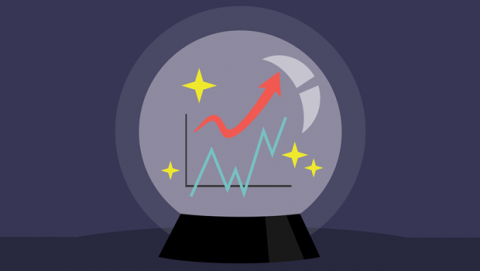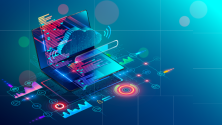December is here, so you know what that means: holiday parties, new year’s resolutions, and a slew of technology predictions. We decided to focus on a trend that matters most urgently to IT leaders—concrete artificial intelligence (AI) insights for your team and business.
The potential impacts of AI are wide-ranging—as are the related forecasts, on everything from sentient to generative and responsible AI, to collaboration and automation. What will matter to IT leaders in 2023? We talked to AI and IT career experts to ask their opinions.
Language I/O CTO Diego Bartolome says that “machine learning will help correct AI bias. In conversational AI, systems that ‘know the customer’ by leveraging information about that particular person will also reduce bias."
And that’s just a starting point. Let’s dig into other key trends.
CTOs will get particular about AI-specifics
“A CTO needs to deliver technology that improves services and processes for healthcare providers. After all, providers want their physicians focused on healthcare delivery, not technology. CTOs should not buy AI because it’s AI or because it’s the latest and greatest tech. Instead, CTOs should think about the potential AI offers. How will it work in their specific organization? How will it improve business processes? That’s critical. Previously, you could get away with saying, ‘We’re implementing AI or digital transformation' and get a blank check, but that’s not going to fly anymore. Organizations want to see results and need to be able to measure impact. A CTO can’t just make a big statement that AI is the future and get whatever budget they want. In 2023, the rubber will meet the road.”
—Michael Armstrong, Chief Technology Officer, Authenticx
Groundbreaking impacts of AI technology
“AI will yield tremendous breakthroughs in treating medical conditions in the next few years. Just look at the 2021 Breakthrough Prize winner Dr. David Baker. Dr. Baker used AI to design completely new proteins. This ground-breaking technology will continue having huge ramifications in the life sciences, potentially developing life-saving medical treatments for diseases like Alzheimer’s and Parkinson’s.
Watch the crossover from fundamental physics into informatics in the guise of quantum and quantum-inspired computing. While I’m not holding my breath for a practical quantum computer, we will see crossover. Perhaps one of the more intriguing examples is Andy Brigg’s QuantrolOx, where AI is being used to tune quantum computers!
The mix of advanced mathematics and informatics will unleash a new generation of engineers uniquely placed to exploit the AI wave.”
—Phil Tee, Co-founder and CEO, Moogsoft
At the crossroads of artificial and human intelligence
“While there will be growing adoption of AI to enhance our collective user experience at scale, it will be balanced with appropriate human intervention. Humans applying the insights provided by AI will be a more effective combination overall than either one doing it alone. How and where this balance is struck will vary depending on the industry and the criticality of the function being performed. For example, radiologists assisted by an AI screen for breast cancer more successfully than they do when they work alone, according to new research. That same AI also produces more accurate results in the hands of a radiologist than it does when operating solo.”
—E.G. Nadhan, Global Chief Architect Leader, Red Hat
[ For more ways AI is changing industries like healthcare and automotive, read Open Source Stories: AI Revolutionaries ]
Responsible and generative AI capabilities are improving
"We can expect to see a few major AI trends in 2023, and two to watch are responsible AI and generative AI. Responsible or ethical AI has been a hot-button topic for some time, but we’ll see it move from concept to practice next year. Smarter technology and emerging legal frameworks around AI are also steps in the right direction. The AI Act, for example, is a proposed, first-of-its-kind European law set forth to govern the risk of AI use cases. Similar to GDPR for data usage, The AI Act could become a baseline standard for responsible AI and aims to become law next Spring. This will have an impact on companies using AI worldwide.
[ How can IT teams prepare for AI? Read Artificial intelligence: 3 tips to ensure responsible and ethical use]
The second, generative AI, will also make major strides over the next 12 months. Recent models can easily create realistic images and drawings from a description in natural language. Capabilities like this are now moving from cool functionality to actual business use cases. Dozens of companies offer you products that will draft essays, ad copy, or love letters. Instead of searching through stock photography, you can type a query and get a newly generated image. And this is just the beginning – we’re only scratching the surface of generative voice and video applications, so it will be interesting to see innovations and use cases come forth in the coming year."
—David Talby, CTO, John Snow Labs
Stronger collaboration between business and IT teams
"In 2023, as companies brace for greater economic volatility, there will be more pressure to not only do more with less but also demonstrate AI’s business value from the onset. Despite IT leaders recognizing the benefits that AI delivers in improved automation, insights, and efficiency, AI still requires stronger collaboration between the business and IT to ensure that the technology is truly addressing business issues and needs.
Another trend we’re already seeing is the continued push to embrace AI holistically across the organization. Various software and hardware solutions—from data models to AI chips—are focused on taking a slice of the lucrative AI pie.”
—Farshid Sabet, Chief Business Officer, Katana Graph
AI will change the efficiency and output of organizations
“There’s an ongoing discussion about whether AI will become sentient and pose a threat to humanity, which greatly overestimates its current capabilities. AI already completes many tasks that would take humans thousands of hours to accomplish: beat chess grandmasters, identify fractures in X-rays, choose the fastest route for a delivery truck, etc. But AI doesn’t 'understand' how it accomplishes these tasks. It can’t explain why one chess move is more strategic than another the way a human could – it just knows. But AI solves a massive array of tasks in and outside of the workplace.
To maximize its use, we need to understand why AI can do so much even though it lacks human-like intelligence. For example, can AI perform many of the tasks people complete in the legal industry, where lawyers still bill their time in six-minute increments? I predict that assigning more tasks to AI will lead to step-changes in teams’ efficiency and output.”
—Chuck Kellner, Strategic Discovery Advisor, Everlaw
AI-driven and supported automation
“Everyone understands the value of automation, and, in our software-defined world, almost everything can be automated. The decision point or trigger for the automation, however, is still one of the trickier elements. This is where AI will increasingly come in: AI can make more intelligent, less brittle decisions than automation’s traditional 'if-this-then-that' rules.”
—Richard Whitehead, CTO and Chief Evangelist, Moogsoft
[ Want to adopt best practices for AI workloads? Get the eBook: Top considerations for building a production-ready AI/ML environment. ]







